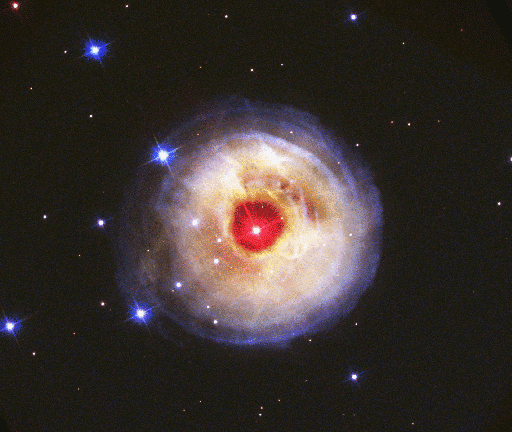Credit & Copyright: H. Bond (STScI),
A. Henden (USNO Flagstaff),
Z. Levay (STScI), et al.,
ESA,
NASA
Explanation:
What caused this outburst of V838 Mon?
For reasons unknown, star V838 Mon's
outer surface suddenly greatly expanded with the
result that it became the brightest star in the entire
Milky Way Galaxy.
Then, just as suddenly, it faded.
A stellar flash like this has never been seen before --
supernovas
and novas expel matter out into space.
Although the V838 Mon flash appears to expel material into space, what is seen in the
above four-frame movie is actually an outwardly moving
light echo of the bright flash.
The actual time-span of the movie is 8 months during 2002.
In a light echo, light from the flash is reflected by successively more distant rings
in the complex array of ambient
interstellar dust
that already surrounded the star.
V838 Mon lies about 20,000
light years away toward the
constellation of
Monoceros, while the largest light echo above spans about
six light years in diameter.
1999 2000 2001 2002 2003 2004 2005 2006 2007 2008 2009 2010 2011 2012 2013 2014 2015 2016 2017 2018 2019 2020 2021 2022 2023 2024 2025 |
Январь Февраль Март Апрель Май Июнь Июль Август Сентябрь Октябрь Ноябрь Декабрь |
NASA Web Site Statements, Warnings, and Disclaimers
NASA Official: Jay Norris. Specific rights apply.
A service of: LHEA at NASA / GSFC
& Michigan Tech. U.
|
Публикации с ключевыми словами:
v838 mon - light echo - вспышки
Публикации со словами: v838 mon - light echo - вспышки | |
См. также:
Все публикации на ту же тему >> | |
